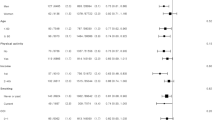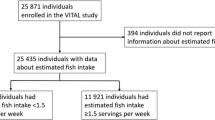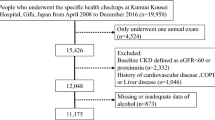Abstract
Background/objectives
Low/moderate alcohol consumption seems to be protective against cardiovascular disease (CVD). This study aimed to investigate the association of wine/beer consumption with the 10-year CVD incidence.
Subjects/methods
During 2001–2002, 3042 CVD-free adults consented to participate in the ATTICA study; of them 2583 completed the 10-year follow-up (85% participation rate), but precise information about fatal/nonfatal CVD incidence (myocardial infarction, angina pectoris, cardiac ischemia, heart failure, chronic arrhythmias, and stroke) was available in 2020 participants (overall retention rate 66%). Alcohol/ethanol intake and the alcoholic beverages consumed were assessed; participants were categorized into three groups (no use; ≤1 glass/week; >1 glass/week).
Results
Alcohol drinking was reported by 56% of the participants who did not develop a CVD event and 49% of those who had (p = 0.04); whereas ethanol intake was 14 ± 16 g among those who did not had an event vs. 21 ± 18 g among those who had a CVD event (p < 0.001). A strong inverse and similar association between low wine/beer intake (≤1 glass/week) and the risk of developing CVD was observed [HR: 0.40, 95% confidence interval (CI): 0.17–0.98; and HR: 0.43, 95% CI: 0.20–0.93, respectively], as compared to abstention. No significant association was found in participants exceeding drinking 1 glass/week compared with abstainers. Compared to <2 g/day ethanol intake, participants who reported 2–10, 10–20, and >20 g/day had CVD-risk HRs (95% CI) of 0.60 (0.40–0.98), 1.22 (0.60–1.14), and 1.81 (0.70–4.61), respectively.
Conclusions
This study revealed similar results of low wine/beer consumption against CVD incidence, mainly due to its implication on low-grade chronic inflammation.
This is a preview of subscription content, access via your institution
Access options
Subscribe to this journal
Receive 12 print issues and online access
$259.00 per year
only $21.58 per issue
Buy this article
- Purchase on Springer Link
- Instant access to full article PDF
Prices may be subject to local taxes which are calculated during checkout

Similar content being viewed by others
References
Gea A, Bes-Rastrollo M, Toledo E, Garcia-Lopez M, Beunza JJ, Estruch R, et al. Mediterranean alcohol-drinking pattern and mortality in the SUN (Seguimiento Universidad de Navarra) Project: a prospective cohort study. Br J Nutr. 2014;111:1871–80.
de Gaetano G, Costanzo S, Di Castelnuovo A, Badimon L, Bejko D, Alkerwi A, et al. Effects of moderate beer consumption on health and disease: a consensus document. Nutr Metab Cardiovasc Dis. 2016;26:443–67.
Sluik D, Bezemer R, Sierksma A, Feskens E. Alcoholic beverage preference and dietary habits: a systematic literature review. Crit Rev Food Sci Nutr. 2016;56:2370–82.
Sieri S, Krogh V, Saieva C, Grobbee DE, Bergmann M, Rohrmann S, et al. Alcohol consumption patterns, diet and body weight in 10 European countries. Eur J Clin Nutr. 2009;63:S81–100.
León-Muñoz LM, Galán I, Valencia-Martín JL, López-García E, Guallar-Castillón P, Rodríguez-Artalejo F. Is a specific drinking pattern a consistent feature of the Mediterranean diet in Spain in the XXI century? Nutr Metab Cardiovasc Dis. 2014;24:1074–81.
Poli A, Marangoni F, Avogaro A, Barba G, Bellentani S, Bucci M, et al. Moderate alcohol use and health: a consensus document. Nutr Metab Cardiovasc Dis. 2013;23:487–504.
Testino G, Patussi V, Leone S, Scafato E, Borro P. Moderate alcohol use and health: a nonsense. Nutr Metab Cardiovasc Dis. 2014;24:e4–5.
Poli A, Marangoni F. Moderate Alcohol and Health Consensus Panel. Response to the letter by Testino et al. on moderate alcohol use and health. Nutr Metab Cardiovasc Dis. 2014;24:e13–4.
Zhang C, Qin YY, Chen Q, Jiang H, Chen XZ, Xu CL, et al. Alcohol intake and risk of stroke: a dose-response meta-analysis of prospective studies. Int J Cardiol. 2014;174:669–77.
Katsiki N, Tziomalos K, Mikhailidis DP. Alcohol and the cardiovascular system: a double-edged sword. Curr Pharm Des. 2014;20:6276–88.
Wood AM, Kaptoge S, Butterworth AS, Willeit P, Warnakula S, Bolton T, et al. Emerging risk factors collaboration/EPIC-CVD/UK Biobank Alcohol Study Group. Risk thresholds for alcohol consumption: combined analysis of individual-participant data for 599,912 current drinkers in 83 prospective studies. Lancet. 2018;391:1513–23.
Costanzo S, Di Castelnuovo A, Donati MB, Iacoviello L, de Gaetano G. Wine, beer or spirit drinking in relation to fatal and nonfatal cardiovascular events: a meta-analysis. Eur J Epidemiol. 2011;26:833–50.
Arranz S, Chiva-Blanch G, Valderas-Martínez P, Medina-Remón A, Lamuela-Raventós RM, Estruch R. Wine, beer, alcohol, and polyphenols on cardiovascular disease and cancer. Nutrients. 2012;4:759–81.
Pitsavos C, Panagiotakos DB, Chrysohoou C, Stefanadis C. Epidemiology of cardiovascular risk factors in Greece: aims, design and baseline characteristics of the ATTICA study. BMC Public Health. 2003;3:32.
Papathanasiou G, Georgoudis G, Papandreou M, Spyropoulos P, Georgakopoulos D, Kalfakakou V, et al. Reliability measures of the short International Physical Activity Questionnaire (IPAQ) in Greek young adults. Hell J Cardiol. 2009;50:283–94.
American Diabetes Association. Report of the Expert Committee on the diagnosis and classification of diabetes mellitus. Diabetes Care. 2014;20:1183–97.
Katsouyanni K, Rimm EB, Gnardellis C, Trichopoulos D, Polychronopoulos E, Trichopoulou A. Reproducibility and relative validity of an extensive semi-quantitative food-frequency questionnaire using dietary records and biochemical markers among Greek schoolteachers. Int J Epidemiol. 1997;26:S118–27.
Arvaniti F, Panagiotakos DB, Pitsavos C, Zampelas A, Stefanadis C. Dietary habits in a Greek sample of men and women: the ATTICA study. Cent Eur J Public Health. 2006;14:74–7.
Panagiotakos DB, Pitsavos C, Stefanadis C. Dietary patterns: a Mediterranean diet score and its relation to clinical and biological markers of cardiovascular disease risk. Nutr Metab Cardiovasc Dis. 2006;16:559–68.
USDA, National Nutrient Database for Standard Reference. Composition of Foods Raw, Processed, Prepared. Release 28, Available at: https://ndb.nal.usda.gov/ndb/
Panagiotakos DB, Georgousopoulou EN, Pitsavos C, Chrysohoou C, Metaxa V, Georgiopoulos GA, et al. ATTICA Study group. Ten-year (2002–12) cardiovascular disease incidence and all-cause mortality, in urban Greek population: the ATTICA Study. Int J Cardiol. 2014;180:178–84.
Pitsavos C, Panagiotakos DB, Kontogianni MD, Chrysohoou C, Chloptsios Y, Zampelas A, et al. The J-shape association of ethanol intake with total homocysteine concentrations: the ATTICA study. Nutr Metab. 2004;1:9.
Chrysohoou C, Panagiotakos DB, Pitsavos C, Skoumas J, Toutouza M, Papaioannou I, et al. Effects of chronic alcohol consumption on lipid levels, inflammatory and haemostatic factors in the general population: the “ATTICA” Study. Eur J Cardiovasc Prev Rehabil. 2003;10:355–61.
Klatsky AL. Alcohol and cardiovascular diseases: where do we stand today? J Intern Med. 2015;278:238–50.
Di Castelnuovo A, Costanzo S, di Giuseppe R, de Gaetano G, Iacoviello L. Alcohol consumption and cardiovascular risk: mechanisms of action and epidemiologic perspectives. Future Cardiol. 2009;5:467–77.
Estruch R, Sacanella E, Badia E, Antúnez E, Nicolás JM, Fernández-Solá J, et al. Different effects of red wine and gin consumption on inflammatory biomarkers of atherosclerosis: a prospective randomized crossover trial. Effects of wine on inflammatory markers. Atherosclerosis. 2004;175:117–23.
Sacanella E, Vázquez-Agell M, Mena MP, Antúnez E, Fernández-Solá J, Nicolás JM, et al. Down-regulation of adhesion molecules and other inflammatory biomarkers after moderate wine consumption in healthy women: a randomized trial. Am J Clin Nutr. 2007;86:1463–9.
Chiva-Blanch G, Magraner E, Condines X, Valderas-Martínez P, Roth I, Arranz S, et al. Effects of alcohol and polyphenols from beer on atherosclerotic biomarkers in high cardiovascular risk men: a randomized feeding trial. Nutr Metab Cardiovasc Dis. 2015;25:36–45.
Chung WG, Miranda CL, Stevens JF, Maier CS. Hop proanthocyanidins induce apoptosis, protein carbonylation, and cytoskeleton disorganization in human colorectal adenocarcinoma cells via reactive oxygen species. Food Chem Toxicol. 2009;47:827–36.
Costanzo S, Di Castelnuovo A, Donati MB, Iacoviello L, de Gaetano G. Alcohol consumption and mortality in patients with cardiovascular disease: a meta-analysis. J Am Coll Cardiol. 2010;55:1339–47.
Acknowledgments
The authors would like to thank the ATTICA study group of investigators: Yannis Skoumas, Natasa Katinioti, Labros Papadimitriou, Constantina Masoura, Spiros Vellas, Yannis Lentzas, Manolis Kambaxis, Konstanitna Paliou, Vassiliki Metaxa, Agathi Ntzouvani, Dimitris Mpougatas, Nikolaos Skourlis, Christina Papanikolaou, Aikaterini Kalogeropoulou, Evangelia Pitaraki, Alexandros Laskaris, Mihail Hatzigeorgiou and Athanasios Grekas, and Eleni Kokkou for either assistance in the initial physical examination and follow-up evaluation, Efi Tsetsekou for her assistance in psychological evaluation and follow-up evaluation, as well as the laboratory team: Carmen Vassiliadou and George Dedousis (genetic analysis), Marina Toutouza-Giotsa, Constantina Tselika, and Sia Poulopouloou (biochemical analysis) and Maria Toutouza for database management.
Funding
D.B. Panagiotakos and E. Georgousopoulou received research grants by Coca-Cola SA. The ATTICA study has been funded by research grants from the Hellenic Cardiology Society and the Hellenic Atherosclerosis Society.
Author information
Authors and Affiliations
Corresponding author
Ethics declarations
Conflict of interest
The authors declare that they have no conflict of interest.
Rights and permissions
About this article
Cite this article
Panagiotakos, D.B., Kouli, GM., Magriplis, E. et al. Beer, wine consumption, and 10-year CVD incidence: the ATTICA study. Eur J Clin Nutr 73, 1015–1023 (2019). https://doi.org/10.1038/s41430-018-0296-6
Received:
Revised:
Accepted:
Published:
Issue Date:
DOI: https://doi.org/10.1038/s41430-018-0296-6



